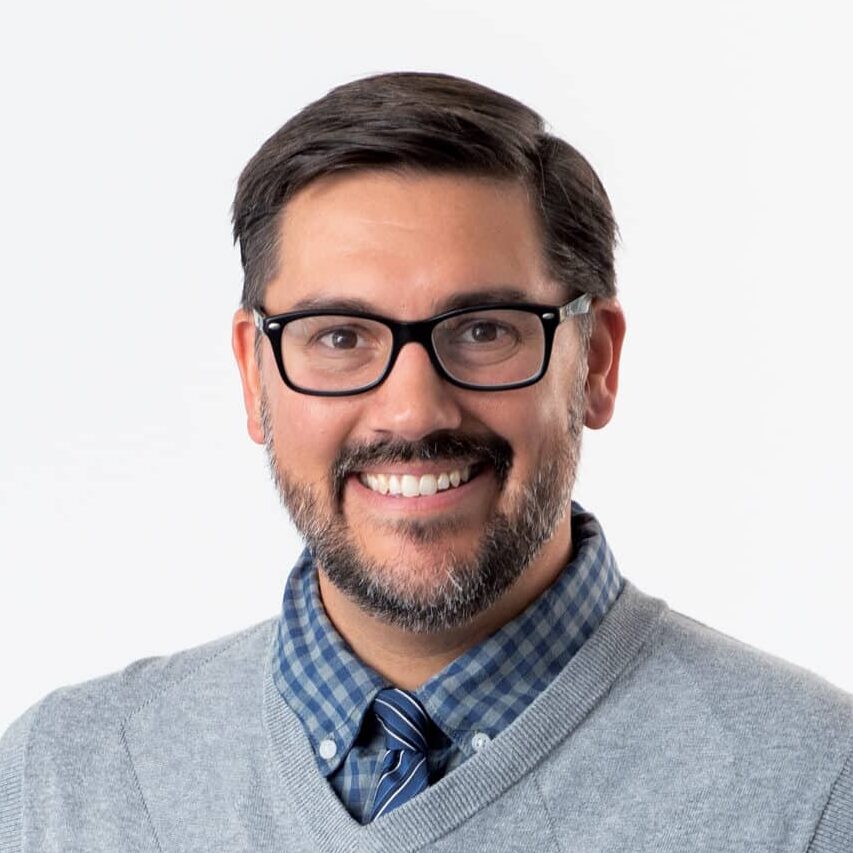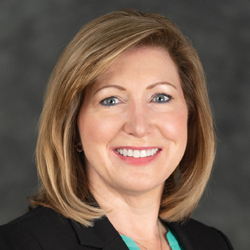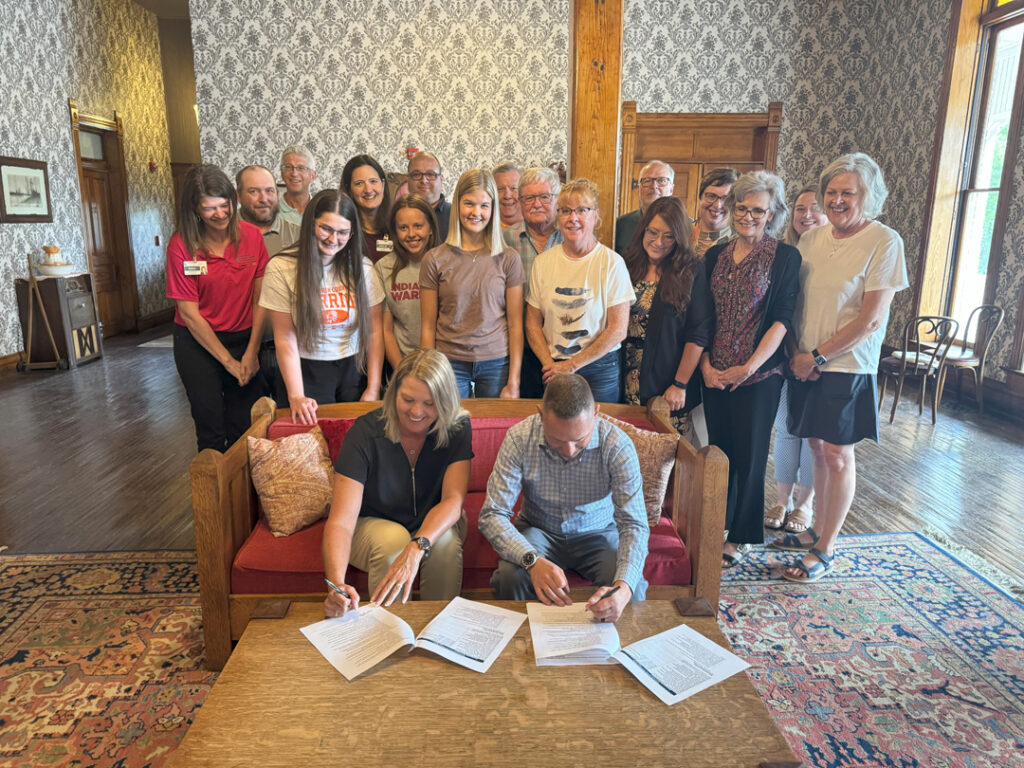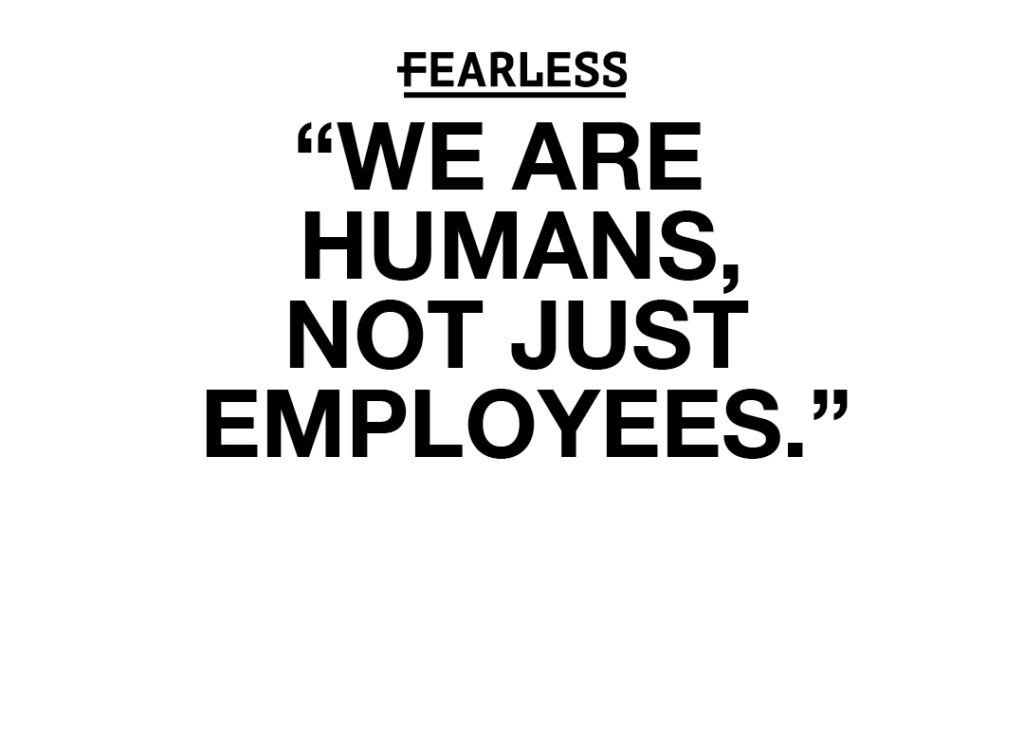Improving rural health through ‘wealth capital’
Iowa Rural Vitality Coalition pilot targets all factors of community wellness for Manchester, Van Buren County

Mike Mendenhall Feb 14, 2025 | 6:00 am
6 min read time
1,452 wordsBusiness Record Insider, Economic Development, Statewide NewsJulie Frick sees quite a bit of “grassroots enthusiasm” in her hometown of Manchester, Iowa.
Except for the eight years she lived and worked in Minneapolis, Frick has spent the majority of her life in the northeast Iowa town of 5,200 where she raised her three now-adult sons and works remotely as a technical project manager for Verizon.
She helps manage Manchester’s $750,000 community endowment initially seeded by the Community Foundation of Greater Dubuque that allows the community to pay for beautification projects like hanging flower baskets in the downtown business district and an annual public Christmas tree lighting ceremony.
Frick says Manchester is a community of doers.
“But some of the things that we need to do are really big that we don’t know how to do and we need help with,” Frick told the Business Record.
Leaders in Manchester, she said, have the will to tackle issues not uncommon to rural Iowa communities, like access to mental health services and child care, the need to address excessive alcohol consumption, and water quality in the Maquoketa River, which runs through town. But they need a plan and the resources to execute.
Enter the Iowa Rural Vitality Coalition and its pilot program, the Comprehensive Rural Wealth Capital Framework.
In early 2024, Manchester, along with the Iowa-Missouri border community of Van Buren County, was selected from 10 applicant communities to participate in the program that coalition members say aims to improve the health and vitality of rural communities by addressing opportunities in their eight categories or “capital” areas.
“It was great to have this opportunity come knocking on our door,” Frick said.
The coalition’s six member organizations were already working in different areas of community health. The members are the Governor’s Empower Rural Iowa Initiative, the Iowa Rural Development Council, Iowa State University Extension and Outreach, the Institute for Decision Making at the University of Northern Iowa, the University of Iowa College of Public Health and Wellmark Blue Cross and Blue Shield.
Mark Reinig, ISU Extension and Outreach community development specialist and Iowa Rural Development Council board member, said the coalition allowed the different members to pool resources to take a holistic approach at improving rural health in Iowa.
The coalition officially announced partnerships with the communities in April 2024. Since then, Manchester and Van Buren County have formed working groups of nearly 60 volunteers each that have drafted an initial report following community meetings to identify desired goals and gathering data with help from coalition members.
The working groups consist of mayors and city managers, school superintendents, county government leaders, local business owners and entrepreneurs, Iowa Department of Natural Resources employees, bankers and other community residents, said Frick, who is a co-chair of the Manchester working group.
Frick says, based on the Manchester group’s research, a first community project, although not yet drafted, could begin in about six months.

Laura Jackson has been working among the executive leadership of Wellmark Blue Cross Blue Shield in Des Moines since 2002 and is currently the health insurance provider’s executive vice president of health equity, access and improvement.
She said in 2023, Wellmark made a commitment to focus on improving the community health of Iowans, whether they were insured by the company or not.
“We’ve been doing a lot of the work in rural communities trying to understand how to improve their health. So when we created this new division, we looked at the data and saw a pretty big disparity in the health outcomes for rural Iowans compared to urban Iowans,” Jackson said. “And because of that, we started to think more deeply about the work we had been doing, and could there be more we should be thinking about.”
Jackson said she connected with Reinig and Iowa Rural Development Council Executive Director Bill Menner to discuss resources, methods and processes to help rural communities address health needs.
“We knew the information [Wellmark] had about how to improve health, but we found a lot of really good partners there that knew how to improve economies,” Jackson said.
“We started to have conversations about, ‘You can’t have a healthy economy if you don’t have healthy people, and if you don’t have healthy people, you don’t have a healthy economy,’” Jackson said. “So if we understood those two things, could we bring economic development and health improvement together in a way that was different than anything that had been done before?”
Soon, they started conversations with ISU Vice President for Extension and Outreach Jason Henderson, University of Iowa College of Public Health Dean and professor of community and behavioral health Edith Parker, and Drew Conrad, University of Northern Iowa director of the Institute for Decision Making.
Reinig said the coalition then found a model it felt would apply to Iowa communities — the Comprehensive Rural Wealth Capital Framework – through a presentation by Ball State University.

Joy Padget, front left, and Richard Nichols, Van Buren County Iowa Rural Vitality Coalition co-chairs, are joined by a group of volunteers to sign the agreement in June 2024 to participate in the Iowa Rural Vitality Coalition pilot program. Photo courtesy of the Iowa Rural Vitality Coalition
Wealth Capital Framework
According to the coalition’s website, the Wealth Capital Framework looks at eight different factors in a community that together, determine a community’s overall health. They include:
- Natural capital: Natural ecosystems; soil, water, forests and minerals that are vital for agricultural, tourism and environmental health.
- Physical capital: The built environment and infrastructure like roads, bridges, buildings and utilities.
- Human capital: Things like skills, knowledge and health of people in a community. That includes education and health care workers.
- Social capital: The strengths and quality of networks and relationships in the community, trust cooperation and ability to work together.
- Financial capital: Financial resources for individuals and businesses, like monetary savings, income and access to credit.
- Cultural capital: These are shared values, traditions and social practices of a community.
- Political capital: Influence and power within a community, governance structures, advocacy for local needs and interests and political engagement.
- Intellectual capital: Knowledge, innovation and intellectual property in a community, technology and other advancements, and the economic development in a community.
“Each type of capital interacts with the others, and strengthening them all can lead to more sustainable and resilient communities,” Menner said in the video. “So why does that matter? Well, it helps a community create balanced development instead of trying to just boost one area like the local economy. The framework helps us balance and improve all areas at once. This means we can build better roads, support local businesses, enhance education, improve health and our environment, and do it all together.”
Jackson said the Wealth Capital Framework operates on findings that show 80% of what makes up someone’s overall health is determined by what happens outside of the health care system.
The preliminary report from the Manchester working group says 40% of health stems from socioeconomic factors like employment and housing; 10% is a person’s physical environment; 30% is health behaviors like diet, alcohol and tobacco consumption; and 20% comes from access and use of quality health care.
Some of the top opportunities in the Manchester report include lowering the ratio of health care providers to population in the state, including mental health providers; addressing the higher rate of tobacco use and excessive drinking; increasing the number of people who live and work in Manchester from the current 23% rate; increasing sense of community,especially among new residents; improving the water quality of the Maquoketa River; and increasing affordable housing stock.
“Our hope is that the community grabs hold of the process,” Reinig said. “… We have so many contacts throughout the U.S. and within Iowa that if they need a resource to help them get to a certain point, we’ll provide that resource and assist them that way to achieve whatever those goals might be that they identify from the project.”
Frick, Jackson and others in the coalition hope the 24-month pilot can be expanded and replicated throughout the state.
“One of the statements that was made during this whole thing was that small towns don’t need big cities, but the big cities need the small towns,” Frick said. “There are a lot of things — we provide farming, and we provide so much to the economy from a small town, even though the small town may not be flourishing. But all the support that the community offers and if we can start something here that the rest of the state can build on, how exciting is that going to be? Who says it has to stay within the state of Iowa? … It just gives me shivers.”

Mike Mendenhall
Mike Mendenhall is associate editor at Business Record. He covers economic development, government policy and law.











